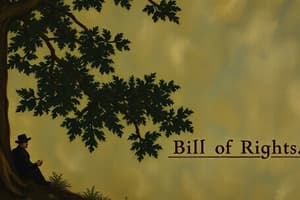Podcast
Questions and Answers
The Bill of Rights was added to the Constitution because ________.
The Bill of Rights was added to the Constitution because ________.
- It was part of the Articles of Confederation
- Alexander Hamilton believed it was necessary
- Key states refused to ratify the Constitution unless it was added (correct)
- It was originally part of the Declaration of Independence
An example of a right explicitly protected by the Constitution as drafted at the Constitutional Convention is the ________.
An example of a right explicitly protected by the Constitution as drafted at the Constitutional Convention is the ________.
- Right to keep and bear arms
- Right not to be subjected to cruel and unusual punishment
- Right to a writ of habeas corpus (correct)
- Right to free speech
The Fourteenth Amendment was critically important for civil liberties because it ________.
The Fourteenth Amendment was critically important for civil liberties because it ________.
- Guaranteed freed slaves the right to vote
- Allowed the states to continue to enact black codes
- Outlawed slavery
- Helped start the process of selective incorporation of the Bill of Rights (correct)
Which of the following provisions is not part of the First Amendment?
Which of the following provisions is not part of the First Amendment?
The Third Amendment can be thought of as ________.
The Third Amendment can be thought of as ________.
The Fourth Amendment's requirement for a warrant ________.
The Fourth Amendment's requirement for a warrant ________.
The Supreme Court case known as Kelo v. City of New London was controversial because it ________.
The Supreme Court case known as Kelo v. City of New London was controversial because it ________.
Which of the following rights is not protected by the Sixth Amendment?
Which of the following rights is not protected by the Sixth Amendment?
The double jeopardy rule in the Bill of Rights forbids which of the following?
The double jeopardy rule in the Bill of Rights forbids which of the following?
The Supreme Court has decided that the death penalty ________.
The Supreme Court has decided that the death penalty ________.
Which of the following rights is not explicitly protected by some state constitutions?
Which of the following rights is not explicitly protected by some state constitutions?
The right to privacy has been controversial for all the following reasons except ________.
The right to privacy has been controversial for all the following reasons except ________.
Flashcards are hidden until you start studying
Study Notes
The Bill of Rights and Ratification
- The Bill of Rights was added to the Constitution to secure ratification from key states that refused to adopt it without these protections.
Constitutional Rights
- The Constitution, as drafted, explicitly protected the right to a writ of habeas corpus among other civil liberties.
Fourteenth Amendment's Impact
- The Fourteenth Amendment was pivotal for civil liberties, initiating the selective incorporation of the Bill of Rights to apply at the state level.
First Amendment Provisions
- The First Amendment guarantees rights like freedom of religion, free speech, and peaceful assembly, but does not include the right to keep and bear arms.
Third Amendment and Privacy
- The Third Amendment contributes to a broader understanding of privacy in the home, alongside the Second and Fourth Amendments.
Fourth Amendment and Warrants
- The requirement for a warrant under the Fourth Amendment does not apply in scenarios where evidence may be destroyed before a warrant can be obtained.
Kelo v. City of New London
- The Supreme Court's decision in Kelo v. City of New London sparked controversy by expanding the government's use of eminent domain.
Sixth Amendment Protections
- The Sixth Amendment ensures rights related to trial and legal representation but does not explicitly include the right to remain silent.
Double Jeopardy
- The double jeopardy rule prohibits the prosecution of an individual for the same crime in both state and federal courts after acquittal.
Death Penalty Limitations
- The Supreme Court has ruled that the death penalty cannot be imposed on individuals who were under the age of 18 at the time of their offense.
Rights in State Constitutions
- Not all rights, such as the right to polygamous marriage, are explicitly protected in state constitutions.
Controversy Surrounding Privacy
- The right to privacy is contentious primarily because it is not clearly stated in the Constitution, and its application has influenced significant legal decisions, including abortion rights. Despite this, a majority of citizens do not support banning birth control by the government.
Studying That Suits You
Use AI to generate personalized quizzes and flashcards to suit your learning preferences.




